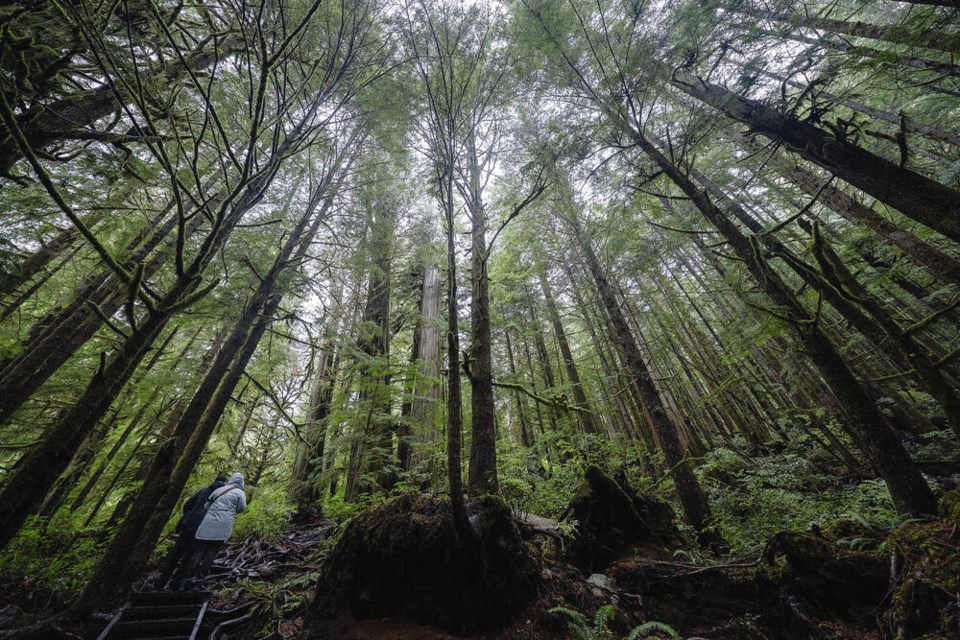Another $90 million was poured into the forest industry by the NDP government on Wednesday to assist companies and workers dealing with the impact of intensifying restrictions on old-growth forests.
The funding was committed during the announcement of more measures to continue the emphasis on protecting old growth.
Premier David Eby said the government is accelerating the protection of B.C.’s oldest and rarest forests. Funding is being allocated to develop several new regional tables where forest landscape planning will be discussed with more First Nations input. Four of those are underway and eight more will be added.
“These tables will prevent harvesting in old-growth forests important for ecosystem health, biodiversity, clean water, carbon storage and Indigenous values,” the government said.
Among the new measures was a cabinet order signed this week that downgrades the importance of recognizing timber supply as a factor in forest planning. That consideration is removed from several key sections of a forest planning regulation. Forests Minister Bruce Ralston said it was outdated wording. Removing it lets decision makers consider other objectives such as water quality and wildlife.
There is also $10 million in new funding through a silviculture innovation program to develop alternatives to clear-cutting. Another $2.4 million is being provided to the First Nations Forestry Council to increase Indigenous participation in the B.C.-wide “co-development” of new forest policy.
A new conservation financing mechanism is promised within six months. It will protect old-growth and biodiverse areas by leveraging hundreds of millions of dollars from philanthropic donations to conservation measures, the government said.
Eby and Ralston said communities and First Nations will be able to finance old-growth protection by selling verified carbon offsets that represent emission reductions, once a renewed version of that program is finalized this year.
The full scope of the old-growth action plan, first announced 14 months ago, will be clearer by the end of 2023, when the plan will be complete.
The $90 million in new industry supports comes through the B.C. Manufacturing Jobs Fund. Eby announced that at a Prince George natural resources forum a week after a curtailment at a Canfor mill there.
A union executive there warned the partial mill shutdown was a result of the old-growth logging deferrals. But Eby told the CBC at the time that several other factors are in play, like the beetle kill and fires.
Now the fund has doubled in the space of a month. The 2022 budget also had a $185 million support package to offset economic impacts from a “changing forest industry.”
The old-growth strategy launched in November 2021 when 2.6 million hectares of varying categories were deferred from cutting plans. At the time, 1.4 million hectares was already protected.
The deferrals were said to be temporary, on a two-year basis, while new management plans emphasizing protection were developed.
Officials at the time estimated the enhanced protection would cost about 4,600 jobs, but other sources in industry put the number far higher.
An update Wednesday said just 11,600 hectares has been harvested since the strategy was announced, about a half per cent of the area in question.
Eby said the areas were left vulnerable by the previous Liberal government and the latest numbers show logging of old growth has fallen to the lowest level on record.
Ralston said B.C. needs “to do more with less” and create more jobs per tree harvested. The money will be used to retrofit mills to allow them to use smaller dimension, formerly known as “junk” wood, to produce different products.
Indigenous forester Gary Merkel, who co-wrote a major review of old-growth strategy and is still an adviser, said it is about much more than stands of trees.
“It’s a problem with the way that we see the land. … If you don’t take care of the land it will ultimately end up killing you.”
Merkel said he is hopeful B.C. will stick to the strategy because now there are 200 separate governments (First Nations) who are involved in the process, “very tied to the land, who hopefully won’t let us flip all over the place again.”
>>> To comment on this article, write a letter to the editor: [email protected]

